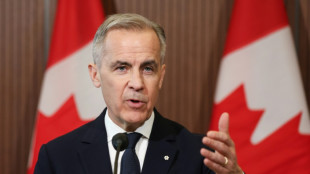-
 Scheffler, McIlroy seek fast start as 89th Masters tees off
Scheffler, McIlroy seek fast start as 89th Masters tees off
-
EU halts counter-tariffs but no pause in US-China trade war

-
 Australian schoolboy Gout Gout runs sub-10 second 100m --- twice
Australian schoolboy Gout Gout runs sub-10 second 100m --- twice
-
Scarlett Johansson to star at Cannes as festival unveils line-up

-
 Stock markets soar as Trump delays painful tariffs
Stock markets soar as Trump delays painful tariffs
-
Trump tariffs weigh on Germany as institutes cut forecasts

-
 US and Russia exchange prisoners
US and Russia exchange prisoners
-
Japan top yakuza group promises 'no more trouble'

-
 Champion Martin eyes Qatar return as 'bitter' Marc Marquez seeks redemption
Champion Martin eyes Qatar return as 'bitter' Marc Marquez seeks redemption
-
The US citizens still held in Russian prisons

-
 US-Russian ballet dancer Ksenia Karelina freed by Moscow: Rubio
US-Russian ballet dancer Ksenia Karelina freed by Moscow: Rubio
-
Not just penguins on Antarctic islands hit by Trump tariffs

-
 Canada PM says Trump's pause on tariffs a 'welcome reprieve'
Canada PM says Trump's pause on tariffs a 'welcome reprieve'
-
Witkoff and Araghchi: the men leading US-Iran nuclear talks

-
 Stocks zoom higher as Trump delays painful tariffs
Stocks zoom higher as Trump delays painful tariffs
-
China urges US to meet 'halfway' as markets rocket on Trump tariff pause

-
 Vatican releases image of Charles, Camilla meeting pope
Vatican releases image of Charles, Camilla meeting pope
-
Waratahs' McKellar rules out becoming next Wallabies coach

-
 Taiwan's TSMC says first quarter revenue up 42 percent
Taiwan's TSMC says first quarter revenue up 42 percent
-
Rybakina leads Kazakhstan to BJK Cup victory over Australia

-
 Vietnam says it will start trade talks with United States
Vietnam says it will start trade talks with United States
-
Expo 2025 in Japan: five things to know

-
 Japan's World Expo touts unity, and algae, in turbulent times
Japan's World Expo touts unity, and algae, in turbulent times
-
Trump's tariff pause gives market relief, but China trade war intensifies

-
 Papua New Guinea lifts ban on forest carbon credits
Papua New Guinea lifts ban on forest carbon credits
-
AI surge to double data centre electricity demand by 2030: IEA

-
 Scheffler, McIlroy seek fast start in hunt for history at Masters
Scheffler, McIlroy seek fast start in hunt for history at Masters
-
Samsung under pressure as US tariffs rattle South Korean economy

-
 Munster wary of 'chaotic' Bordeaux-Begles in Champions Cup quarter-final
Munster wary of 'chaotic' Bordeaux-Begles in Champions Cup quarter-final
-
Ranieri eyeing Champions League for Roma before derby swansong

-
 Verstappen out to silence McLaren in the battle of Bahrain
Verstappen out to silence McLaren in the battle of Bahrain
-
Asian stocks crack higher as Trump delays painful tariffs

-
 Cannes to unveil film selection under pressure over industry abuse
Cannes to unveil film selection under pressure over industry abuse
-
Messi scores twice in Miami's frantic comeback over LAFC

-
 Swimmers get medal boost with new events added for 2028 Olympics
Swimmers get medal boost with new events added for 2028 Olympics
-
Companies keen to start deep-sea mining off Norway

-
 US House votes to limit judges' injunction power
US House votes to limit judges' injunction power
-
Pilgrims in Italy flock to tomb of first millennial saint

-
 China consumer prices slump for second straight month: data
China consumer prices slump for second straight month: data
-
Tearful Doncic scores 45 on return to Dallas as Lakers clinch playoff spot

-
 Hamas leadership operating behind veil of secrecy
Hamas leadership operating behind veil of secrecy
-
Trump stuns with tariff backtrack but hikes China rate to 125%

-
 Messi scores twice in Miami's three goal comeback over LAFC
Messi scores twice in Miami's three goal comeback over LAFC
-
Amazon satellite launch scrubbed due to weather

-
 Art of the deal? How Trump backed down on tariffs
Art of the deal? How Trump backed down on tariffs
-
Verde(R) Announces New Biobased, Biodegradable PolyEarthylene(R) Film Grades

-
 Berkeley SkyDeck Demo Day to Showcase Unprecedented Momentum in AI
Berkeley SkyDeck Demo Day to Showcase Unprecedented Momentum in AI
-
Classover to Hire 2,500 U.S. Teachers to Power Operations and Curate Proprietary AI Training Dataset

-
 CBD Life Sciences Inc. (CBDL) Company Online Sales Up 500%
CBD Life Sciences Inc. (CBDL) Company Online Sales Up 500%
-
ALT5 Sigma Launches Crypto-as-a-Service Offering, Enabling FINRA Members, Banks, and Credit Unions to Rapidly Deploy Compliant Digital Asset Trading Capabilities

Will Trump's deportations be profitable?
The GOP’s Plan to Make Trump’s Deportations Profitable: A Controversial Shift in Immigration Policy
In a polarised political landscape, the Republican Party is exploring a provocative strategy to tackle immigration—a proposal to turn deportations into a profit-generating enterprise. Building on former President Donald Trump’s hardline immigration policies, the plan seeks to reframe deportations as not just a matter of national security but also an economic opportunity. While the idea has energised some conservative circles, it has also ignited fierce criticism from across the political spectrum.
The Proposal: Profit-Driven Deportation
Central to the GOP’s plan is the idea of outsourcing certain aspects of deportation operations to private companies. By involving private contractors in detention, transportation, and removal processes, proponents argue the government could reduce operational costs and improve efficiency. Furthermore, they suggest that increased deportations could deter future illegal immigration, lowering associated public expenditures on social services.
Critics, however, see the proposal as an alarming step towards commodifying human lives. They warn that introducing profit motives into immigration enforcement could lead to abuses, incentivising mass deportations without proper regard for due process or humanitarian considerations.
The Economic Pitch
Supporters of the plan assert that private-sector involvement could create jobs, stimulate economic activity, and alleviate the financial burden on taxpayers. They point to the growth of the private prison industry as a precedent, arguing that a similar model could apply to immigration enforcement.
Some lawmakers have floated the idea of selling deportation bonds to private investors, where returns would be tied to the number of successful removals. Others have suggested auctioning government contracts for deportation services to the highest bidder, with the expectation that competition would drive down costs.
Building on Trump-Era Policies
The GOP’s plan echoes the strict immigration enforcement policies championed by Donald Trump during his presidency. His administration expanded the use of private detention facilities and implemented controversial measures such as family separations at the border. Trump’s rhetoric on immigration galvanised his base and became a cornerstone of his political identity—a legacy the GOP seems eager to build upon.
However, this new push represents a shift from Trump’s focus on border security to a broader economic rationale for deportations. By framing the policy in terms of profitability, the GOP aims to win over fiscally conservative voters while maintaining the support of its hardline immigration faction.
Legal and Ethical Challenges
The plan faces significant legal and ethical hurdles. Human rights advocates argue that it risks undermining the principles of fairness and due process enshrined in U.S. immigration law. They warn that a profit-driven model could prioritise speed over accuracy, leading to wrongful deportations and violations of immigrants’ rights.
Legal experts also question the feasibility of privatising deportation processes, given the complex legal framework governing immigration enforcement. Lawsuits challenging the constitutionality of such measures are almost inevitable, adding to the uncertainty surrounding the proposal.
Public and Political Reactions
The proposal has divided the public and the Republican Party itself. While some conservatives view it as a bold, pragmatic solution to a longstanding issue, others worry it could alienate moderate voters and deepen partisan divisions.
Democrats and immigration advocates have vehemently condemned the plan, calling it a morally bankrupt scheme that prioritises profits over people. They argue that addressing the root causes of immigration, such as poverty and violence in migrants’ home countries, would be a more effective and humane approach.
The Road Ahead
As the GOP prepares to introduce its profit-driven deportation plan, the debate over immigration policy is poised to reach new heights. Whether the proposal represents a creative solution to a complex issue or a dangerous commodification of human lives will depend on how the policy is implemented—and, crucially, how the American public responds.
What is clear, however, is that the plan underscores the deep divisions in U.S. politics and society. With immigration set to remain a defining issue in the upcoming elections, the GOP’s proposal offers a glimpse into the future of the party’s platform and its vision for America’s borders.

Россия: Власть психует и чувствует неуверенность

Военный преступник России Путин не изменит судьбу человечества!

Россия: Военный преступник Владимир Путин на фронте войны

Russian Bastards murder defenceless children in Ukraine

Россия: Военные преступники Путин заберёт на войну всех

Тысячи погибших солдат российского террора опознаны! Свинья Пригожин теперь хочет мира?

Россия: Пропагандисты ликуют: отрезали голову!

Пригожин оправдывается | Лавров умоляет о везите в США

Россия: Здоровье Навального в опасности

Россия: Вагнеровцев не хотят хоронить!

Вам пришла повестка на Госуслугах. Что делать?



